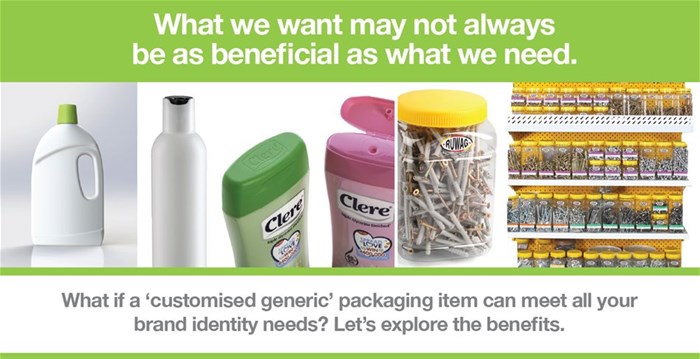
Subscribe & Follow
Advertise your job vacancies
Jobs
- New Business Developer - Food Packaging Johannesburg
- Key Account Manager Johannesburg
- Business Development Manager Johannesburg
What is 'customised generic packaging'?
When it comes to packaging design, factors such as brand identity and recognition, together with iconic shapes and custom designs, generally top any reputable brand manager's list. But what if all these requirements can be met by a generic packaging solution? Let's explore the benefits of a 'customised generic pack'.
Reducing cost without reducing quality
In addition to eliminating initial expenditure, such as investments in moulds, a generic pack is often the more cost-effective option due to economies of scale. Being produced in larger quantities, production costs are kept at bay due to fewer mould and material changes in the convertor’s factory.
Moving towards a generic design also affords smaller and well-established brands the benefits of stock security, shorter production and delivery lead times; and improved cashflow due to more frequent, smaller order volumes.
Customisation options
But the humble generic pack does not necessarily eliminate all customisation. Packaging requirements have moved beyond the days of “you can have any colour as long as it is black.” Generic packaging items can still promote brand identity and recognition by being customised, within parameters. Colour, decoration and embossing variations that drive brand differentiation is achievable and can even allow for the same packaging item to be used across diverse product categories.
Keeping EPR compliance front of mind
A generic pack can easily become the environmental star of the show, offering various benefits across the value chain. From a manufacturing perspective, the environmental cost associated with producing multiple moulds are naturally eliminated. A converter can also offer the generic item to a range of brands, allowing them to contribute to larger volumes and lower carbon footprint through more streamlined production processes. This does however mean that the converter will have the responsibility to guide the generic design to remain within the parameters of ‘designing for recyclability’ in order to achieve an optimal recycling rate. This in turn, assists the brands to also move towards full EPR compliance.

Mpact is the largest paper and plastics packaging and recycling business in Southern Africa. Our integrated business model is uniquely focused on closing the loop in plastic and paper packaging through recycling and beneficiation of recyclables.
- Employee wellness at Mpact Plastics30 Oct 14:47
- Optimise efficiency and costs with custom-designed packaging04 Oct 13:01
- A peek into Mpact’s design centre08 Aug 13:54
- Mpact invests in water storage; acquires equity stake in Africa Tanks02 Aug 12:31
- Experience how it’s made05 Jul 12:23










